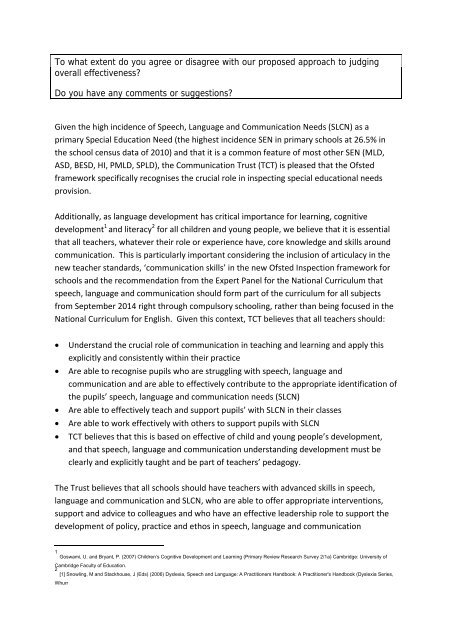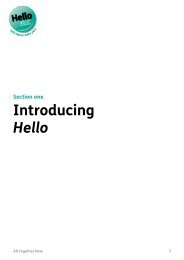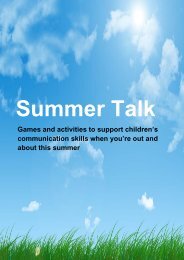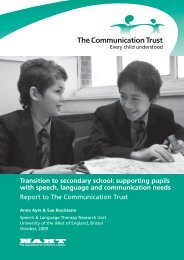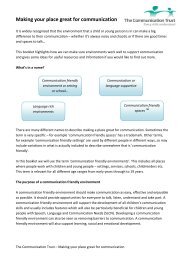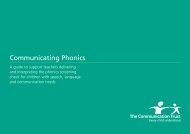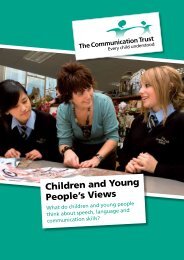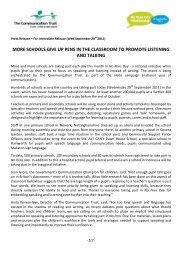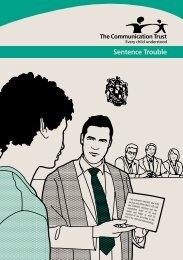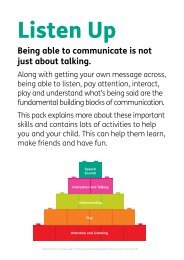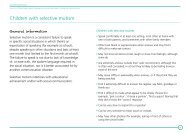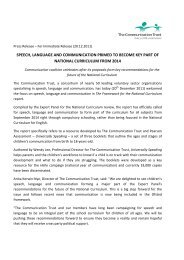here - The Communication Trust
here - The Communication Trust
here - The Communication Trust
Create successful ePaper yourself
Turn your PDF publications into a flip-book with our unique Google optimized e-Paper software.
To what extent do you agree or disagree with our proposed approach to judging<br />
overall effectiveness?<br />
Do you have any comments or suggestions?<br />
Given the high incidence of Speech, Language and <strong>Communication</strong> Needs (SLCN) as a<br />
primary Special Education Need (the highest incidence SEN in primary schools at 26.5% in<br />
the school census data of 2010) and that it is a common feature of most other SEN (MLD,<br />
ASD, BESD, HI, PMLD, SPLD), the <strong>Communication</strong> <strong>Trust</strong> (TCT) is pleased that the Ofsted<br />
framework specifically recognises the crucial role in inspecting special educational needs<br />
provision.<br />
Additionally, as language development has critical importance for learning, cognitive<br />
development 1 and literacy 2 for all children and young people, we believe that it is essential<br />
that all teachers, whatever their role or experience have, core knowledge and skills around<br />
communication. This is particularly important considering the inclusion of articulacy in the<br />
new teacher standards, ‘communication skills’ in the new Ofsted Inspection framework for<br />
schools and the recommendation from the Expert Panel for the National Curriculum that<br />
speech, language and communication should form part of the curriculum for all subjects<br />
from September 2014 right through compulsory schooling, rather than being focused in the<br />
National Curriculum for English. Given this context, TCT believes that all teachers should:<br />
• Understand the crucial role of communication in teaching and learning and apply this<br />
explicitly and consistently within their practice<br />
• Are able to recognise pupils who are struggling with speech, language and<br />
communication and are able to effectively contribute to the appropriate identification of<br />
the pupils’ speech, language and communication needs (SLCN)<br />
• Are able to effectively teach and support pupils’ with SLCN in their classes<br />
• Are able to work effectively with others to support pupils with SLCN<br />
• TCT believes that this is based on effective of child and young people’s development,<br />
and that speech, language and communication understanding development must be<br />
clearly and explicitly taught and be part of teachers’ pedagogy.<br />
<strong>The</strong> <strong>Trust</strong> believes that all schools should have teachers with advanced skills in speech,<br />
language and communication and SLCN, who are able to offer appropriate interventions,<br />
support and advice to colleagues and who have an effective leadership role to support the<br />
development of policy, practice and ethos in speech, language and communication<br />
1<br />
Goswami, U. and Bryant, P. (2007) Children’s Cognitive Development and Learning (Primary Review Research Survey 2/1a) Cambridge: University of<br />
Cambridge Faculty of Education.<br />
2<br />
[1] Snowling, M and Stackhouse, J (Eds) (2006) Dyslexia, Speech and Language: A Practitioners Handbook: A Practitioner's Handbook (Dyslexia Series,<br />
Whurr
throughout schools. We believe that t<strong>here</strong> should be a recognised specialism in Speech,<br />
Language and <strong>Communication</strong> Needs and that all schools should have effective access to,<br />
and input from, teachers with specialist skills, either within their school or through an<br />
appropriate network or cluster approach.<br />
Consequently, we would like to see the framework ensure that all teachers are incentivised<br />
to understand and capitalise on the crucial role of communication skills within their<br />
classroom for all pupils, as well as having the skills and knowledge to effectively identify,<br />
support and teach pupils with SLCN is clear. We would like to bring to your attention that<br />
the skills and associated knowledge that we believe are required are detailed in <strong>The</strong><br />
<strong>Communication</strong> <strong>Trust</strong>’s Speech, Language and <strong>Communication</strong> Framework (SLCF) across 4<br />
stages, from universal skills, through enhanced and specialist to those developed through<br />
masters level learning.<br />
To what extent do you agree or disagree with our proposed approach to judging the<br />
quality of training across the partnership?<br />
Do you have any comments or suggestions?<br />
A number of points which inspectors will evaluate in their inspection have a strong<br />
relationship to understanding and effective practice in speech, language and<br />
communication, for example:<br />
• ‘trainees need to be confident and competent in teaching reading and language skills by<br />
the end of their training’<br />
• ‘the training prepares trainees to promote good behaviour through their teaching and<br />
manage challenging behaviour’ (many children and young people with behaviour needs<br />
have speech, language and communication needs, many of which are undetected)<br />
• ‘the training prepares trainees to develop learners’ numeracy and literacy skills’ – the<br />
new Ofsted framework for inspecting schools includes communication skills – this should<br />
be explicitly referenced in this document also<br />
• the training prepares trainees to assess learners’ achievement and plan and teach<br />
lessons that ensure that all learners, including those who have special educational needs<br />
and/or disabilities, make good progress .<br />
It’s important t<strong>here</strong>fore, for ITE providers and Ofsted inspectors to be fully aware of the<br />
crucial role of communication for all learners, including those with additional speech,<br />
language and communication needs, particularly in the light of the new schools inspection’s<br />
inclusion on communication skills.
To support some of these areas, TCT has undertaken activities in supporting the work of<br />
initial teacher training. <strong>The</strong> first is the enclosed information booklet for trainees ‘Let’s Talk<br />
about it’ (www.thecommunicationtrust.org.uk/publications )which sets out the key role of<br />
speech, language and communication in the classroom, as well as supporting identification<br />
and practice with pupils with SLCN. <strong>The</strong> second is a specialist‐delivered session on SLCN<br />
which was requested by universities which has been successfully piloted with several<br />
hundred trainees and which will be further rolled out in 2012.


